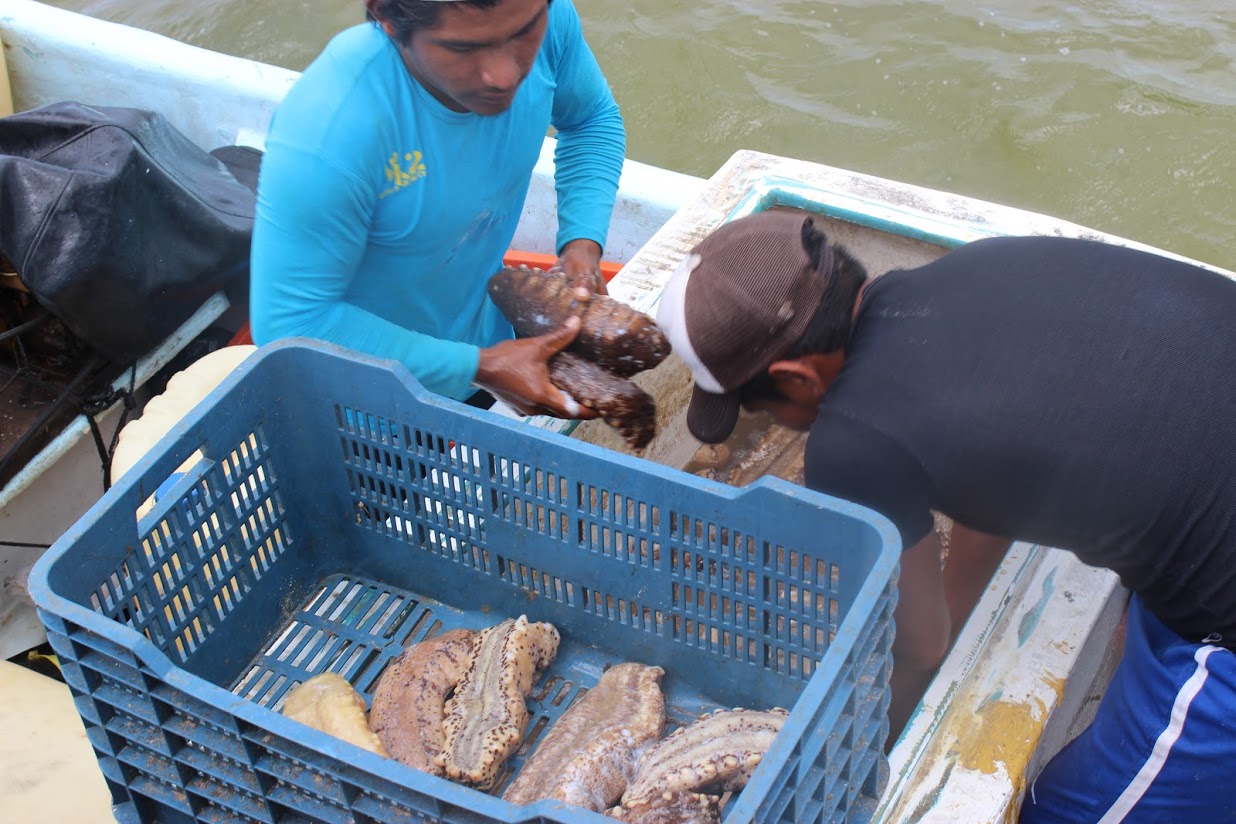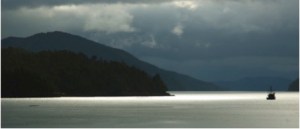Tag Archives: Small Scale Fisheries
Webinar: A Global Spotlight on Ocean Defenders
Video
This webinar titled “A Global Spotlight on Ocean Defenders” aims to bring greater visibility to the plight of Ocean Defenders worldwide. Ocean Defenders include individuals, groups, and communities of small-scale fishers and Indigenous Peoples who are actively protecting the marine environment and human rights. Unfortunately, ocean defenders are often marginalized, criminalized, threatened, and even murdered for their efforts to safeguard the ocean. This webinar explores the ongoing struggles and efforts of ocean defenders globally, and sheds light on the potential avenues through which allies and organizations can provide support and protect ocean defenders.
This webinar will be of interest to a diverse audience of ocean defenders, conservation practitioners, researchers, policy-makers, and funders who are committed to protecting oceans and people. Speakers present an overview of the Ocean Defenders Project, followed by global case studies on Ocean Defenders, discuss potential strategies for effective support, and the ocean defenders themselves will share their lived experiences.
Speakers include:
Nathan Bennett (Global Oceans Lead Scientist, WWF & Chair, People and the Ocean Specialist Group, IUCN)
David Boyd (UN Special Rapporteur on Human Rights and the Environment & University of British Columbia)
Philippe Le Billon (School of Public Policy and Global Affairs, University of British Columbia)
Rocio Lopez de La Lama (School of Public Policy and Global Affairs, University of British Columbia)
Paula Satizabal (Helmholtz Institute for Functional Marine Biodiversity, University of Oldenburg, Germany)
Taryn Pereira (Coastal Justice Network and One Ocean Hub, Rhodes University, South Africa)
Samiya Selim (Center for Sustainable Development, University of Liberal Arts, Bangladesh)
Francisco Araos (Antropologia de la Conservación, Universidad de Los Lagos, Chile)
Kristen Walker Painemilla (Chair, Commission on Environmental, Economic and Social Policy, International Union for the Conservation of Nature)
Webinar Recording – Equity and Justice in the Ocean
If you missed my recent talk on “Equity and Justice in the Ocean” hosted by the Marine Social Science Network, you can watch a recording here.
The oceans are experiencing a rapid acceleration of both conservation and development activities. When poorly implemented or left unchecked, these activities can lead to environmental and social injustices for the coastal communities and populations who inhabit and rely on the ocean for livelihoods, food security, and cultural survival. In this talk, I examine the types of social injustices that are occurring in the ocean, discuss how social equity can be taken into account in efforts to promote ocean sustainability, and explore priority areas for future marine social science research on equity and justice in the oceans. My aim is to encourage greater engagement with equity and justice considerations in all ocean-focused organizations and in all decision-making processes related to ocean governance and management.
This talk will draw from and build on a number of recent papers related to these topics:
• Bennett, N. J. (2018). Navigating a just and inclusive path towards sustainable oceans. Marine Policy, 97, 139–146. https://doi.org/10.1016/j.marpol.2018.06.001
• Bennett, N. J et al. (2019). Just Transformations to Sustainability. Sustainability, 11(14), 3881. https://doi.org/10.3390/su11143881
• Bennett, N. J. et al. (2019). Towards a sustainable and equitable blue economy. Nature Sustainability. https://doi.org/10.1038/s41893-019-0404-1
• Bennett, N. J. et al. (2021). Advancing Social Equity in and Through Marine Conservation. Frontiers in Marine Science. https://doi.org/10.3389/fmars.2021.711538
•Bennett, N. J. et al. (2021). Blue growth and blue justice: Ten risks and solutions for the ocean economy. Marine Policy, 125, 104387. https://doi.org/10.1016/j.marpol.2020.104387
Mobilizing in support of small-scale fisheries impacted by COVID-19
Background: The COVID-19 pandemic has rapidly spread around the world with extensive social and economic effects for the small-scale fisheries sector and coastal communities. Much of the news is dismal for the more than 100 million people working as small-scale fishers or in post-harvest jobs. Documented negative consequences have included complete shut-downs, market disruptions, increased health risks, further marginalization, exacerbated vulnerabilities, and increased illegal fishing. Some positive outcomes have also emerged such as food sharing, the revival of local food networks, increases in local sales, collective actions to safeguard rights, collaborations between communities and governments, and reduced fishing pressure in some places. Yet, we are concerned that the collective response thus far is insufficient to meet the scale and nature of the impacts that are being experienced by the small-scale fisheries sector. Thus, we urge governments, development organizations, NGOs, donors, the private sector, and researchers to rapidly mobilize in support of small-scale fishers and coastal fishing communities

Recommendations: Suggested responses include:
- Governments and development organizations can protect workers, safeguard supply chains, augment social and health services, provide economic relief, and prioritize re-opening small-scale fisheries.
- NGOs can aggregate insights, mobilize financial resources and personnel, support market development, advocate for SSFs, and coordinate activities.
- Donors can identify options to support, re-orient funding programs, be flexible with already allocated funds, and target funds to support SSF.
- The private sector can protect the safety of workers, strengthen social safeguards, source from SSFs, and ensure market access.
- Researchers can research social impacts, identify solutions, communicate recommendations, support advocacy, and re-orient research projects and funds.
|
KEY MESSAGE The COVID-19 pandemic is having substantial impacts on the small-scale fisheries sector globally. Thus, we urge governments, development organizations, NGOs, donors, the private sector, and researchers to rapidly mobilize in support of small-scale fishers and coastal fishing communities. |
*For more information, please refer to the following open access paper: Bennett, N. J., Finkbeiner, E., Ban, N. C., Belhabib, D., Jupiter, S. D., Kittinger, J. N., Mangubhai, S., Scholtens, J., Gill, D., & Christie, P. (2020). The COVID-19 pandemic, small-scale fisheries and coastal fishing communities. Coastal Management. http://dx.doi.org/10.1080/08920753.2020.1766937
A PDF of this Policy Brief can be found here: POLICY BRIEF – Mobilizing in support of small-scale fisheries impacted by COVID-19
If you have any questions, please contact me.
Policy Brief: Marine Social Science and Ocean Sustainability
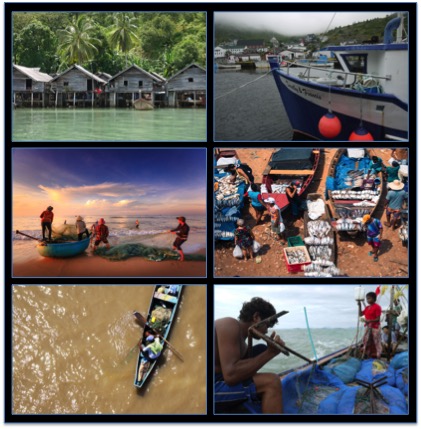
Around the world, the marine and coastal environment is occupied, used and relied on by coastal communities, small-scale fishers, and Indigenous peoples.
Background: Marine protected areas, marine spatial planning, fisheries management, climate adaptation and economic development activities are increasing across the world’s oceans. Coastal communities, indigenous peoples, and small-scale fishers also occupy, use and rely on the ocean and coastal environment for livelihoods, for sustenance, and for wellbeing. An understanding of the human dimensions of the peopled seas is required to make informed marine policy and management decisions. A diverse set of social science disciplines, methods, and theories can be applied to rigorously study the human dimensions of ocean and coastal issues and challenges. Insights from the marine social sciences include:
- Documenting the social context (eg, uses, benefits, values, rights, knowledge, culture) to inform planning and management;
- Characterizing and evaluating the appropriateness and effectiveness of governance processes and management actions;
- Assessing the impacts of conservation, management or development activities on coastal economics and human well-being; and,
- Identifying the social and institutional factors that influence people’s behaviours, actions or responses to identify effective interventions.
The marine social sciences must be part of the mandate and investments of national and international ocean science, policy and sustainability initiatives. Yet, marine social science often receives limited attention and investments from ocean-focused government agencies, NGOs and funders.
Recommendations: Recommended actions include:
- Policy-makers, managers and practitioners need to account for the human dimensions in all marine conservation, marine planning, fisheries management and ocean development decisions.
- Governments should ensure that ocean-focused laws, policies and planning processes require the consideration of social, cultural, economic and governance considerations.
- National and international ocean science and sustainability initiatives, such as the UN Decade of Ocean Science for Sustainable Development (2021-2030), must include social science in their mandates and investments.
- Financial support is needed from ocean-focused government agencies, multi-lateral organizations, NGOs and funders for capacity, programs and infrastructure to enable applied and policy-relevant marine social science research.
|
KEY MESSAGES The pursuit of sustainable oceans must be informed by insights from the marine social sciences. Recent years have seen significant growth in conservation, management and development activities in the ocean. Coastal communities, indigenous peoples, and small-scale fishers also occupy and rely on the ocean for livelihoods, for subsistence, and for wellbeing. Thus, an understanding of the human dimensions is required to make evidence-based decisions across marine policy realms. Greater support for marine social science programs and capacity are needed from ocean-focused government agencies, NGOs, and funders. |
A PDF Version of this Policy Brief is available here: Policy Brief – Marine Social Science and Ocean Sustainability
For more information regarding this topic, see the following paper: N Bennett (2019), Marine Social Science for the Peopled Seas, Coastal Management, 47(2), 244-252. (Link)
Contact: Dr. Nathan Bennett (link) is the Chair of the People and the Ocean Specialist Group of the Commission on Ecological, Economic and Social Policy of the International Union for the Conservation of Nature (link) and the Principal Investigator of The Peopled Seas Initiative.
Maintaining coastal and Indigenous community access to marine resources and the ocean in Canada
 A group representing academics, Indigenous peoples, fishers, and NGOs recently published a review and policy perspective paper in Marine Policy urging that access for coastal and Indigenous communities should be a priority consideration in all policies and decision-making processes related to fisheries and the ocean in Canada. The ability to use and benefit from marine resources (including fisheries) and areas of the ocean or coast is central to the sustainability of coastal communities. In Canada, however, access to marine resources and spaces is a significant and growing issue for many coastal and Indigenous communities due to an increasingly busy ocean: ocean-related development, competition over fisheries and marine resources, and marine planning and conservation activities that confine activities to certain areas. Loss of access has implications for the well-being, including economic, social, cultural, health, and political considerations, and persistence of coastal and Indigenous communities across the Pacific, Atlantic and Arctic coasts of Canada. The vibrancy and continuity of these communities is important to Canadian society for many reasons, including identity, autonomy, sovereignty, culture, healthy rural-urban dynamics, and environmental sustainability. Greater attention is needed to the various factors that support or undermine the ability of coastal and Indigenous communities to access and benefit from the ocean and how to reverse the current trend to ensure that coastal and Indigenous communities thrive in the future.
A group representing academics, Indigenous peoples, fishers, and NGOs recently published a review and policy perspective paper in Marine Policy urging that access for coastal and Indigenous communities should be a priority consideration in all policies and decision-making processes related to fisheries and the ocean in Canada. The ability to use and benefit from marine resources (including fisheries) and areas of the ocean or coast is central to the sustainability of coastal communities. In Canada, however, access to marine resources and spaces is a significant and growing issue for many coastal and Indigenous communities due to an increasingly busy ocean: ocean-related development, competition over fisheries and marine resources, and marine planning and conservation activities that confine activities to certain areas. Loss of access has implications for the well-being, including economic, social, cultural, health, and political considerations, and persistence of coastal and Indigenous communities across the Pacific, Atlantic and Arctic coasts of Canada. The vibrancy and continuity of these communities is important to Canadian society for many reasons, including identity, autonomy, sovereignty, culture, healthy rural-urban dynamics, and environmental sustainability. Greater attention is needed to the various factors that support or undermine the ability of coastal and Indigenous communities to access and benefit from the ocean and how to reverse the current trend to ensure that coastal and Indigenous communities thrive in the future.
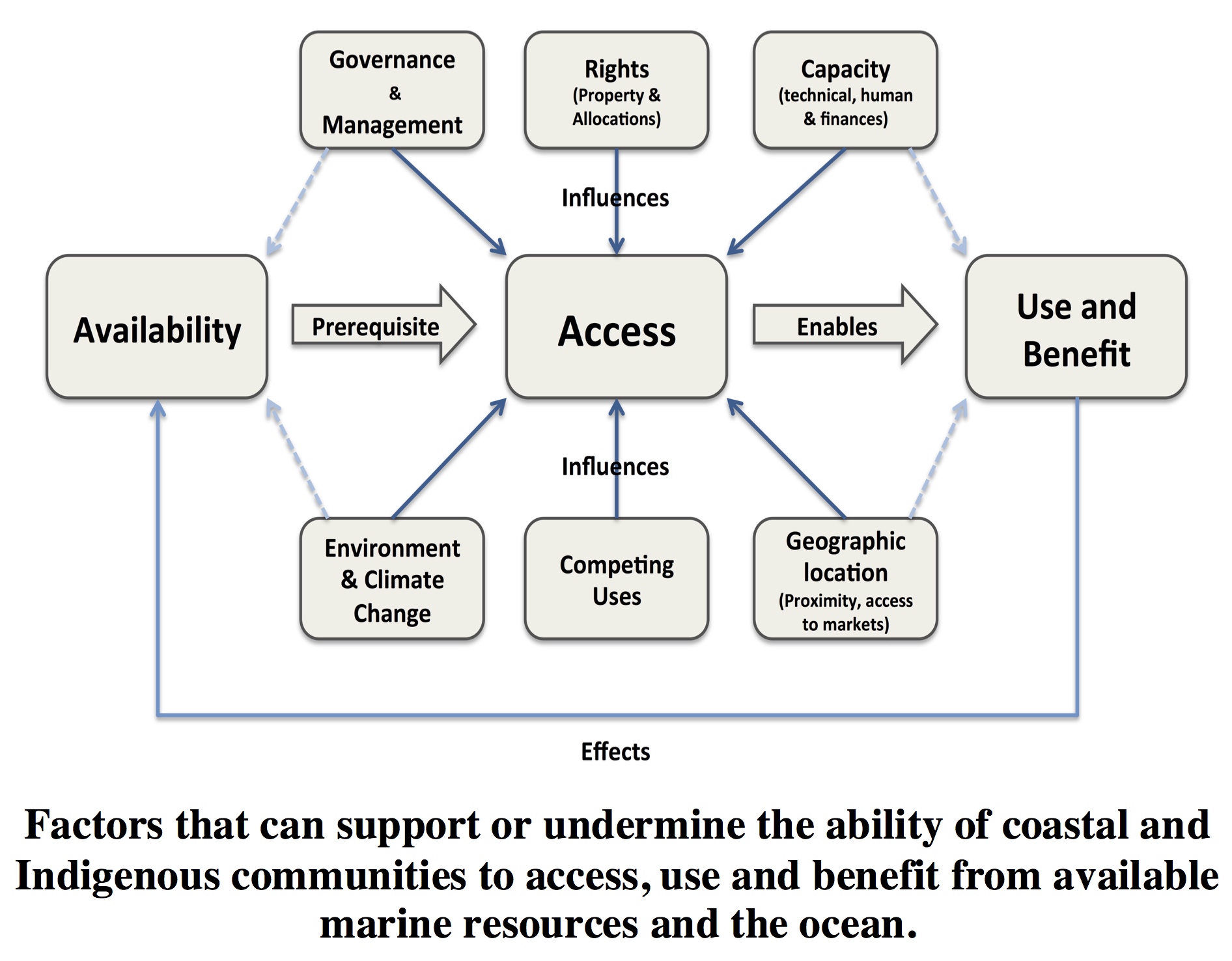
|
KEY MESSAGES Access to marine resources and the ocean is important for the well-being of coastal populations. In Canada, the ability of many coastal and Indigenous communities to access and benefit from the ocean is a growing issue. Access for coastal and Indigenous communities should be a priority consideration in all policies and decision-making processes related to fisheries and the ocean in Canada. Taking action now could reverse the current trend and ensure that coastal and Indigenous communities thrive in the future. |
Recommended actions include:
- Ensuring access is proactively and transparently considered in all fisheries and ocean-related decisions.
- Supporting policy-relevant research on access issues to fill knowledge gaps and enable effective policy and management responses.
- Making data publicly available and accessible and including communities in decision-making processes that grant or restrict access to adjacent marine resources and spaces.
- Ensuring updated laws, policies and planning processes explicitly incorporate access considerations.
- Identifying and taking priority actions now to maintain and increase access, when appropriate and sustainable, for coastal and Indigenous communities.
|
**For more information, refer to the following publication and policy brief: Bennett NJ et al. 2018. Coastal and Indigenous community access to marine resources and the ocean: A policy imperative for Canada. Marine Policy 87:186–193. Link: https://www.sciencedirect.com/science/article/pii/S0308597X17306413 Policy Brief: Maintaining coastal and Indigenous community access to marine resources and the ocean in Canada |
This work was supported by the OceanCanada Partnership through a grant from the Social Science and Humanities Research Council (SSHRC) of Canada. For more information, please email myself (nathan.bennett@ubc.ca) or Megan Bailey (megan.bailey@dal.ca).
How the popularity of sea cucumbers is threatening coastal communities
Coastal communities are struggling with the complex social and ecological impacts of a growing global hunger for a seafood delicacy, according to a new study from the University of British Columbia.
“Soaring demand has spurred sea cucumber booms across the globe,” says lead author Mary Kaplan-Hallam, who conducted the research as a master’s student with the Institute for Resources, Environment and Sustainability (IRES) at UBC.
“For many coastal communities, sea cucumber isn’t something that was harvested in the past. Fisheries emerged rapidly. Money, buyers and fishers from outside the community flooded in. This has also increased pressure on other already overfished resources.”
Sea cucumber can sell for hundreds–sometimes thousands–of dollars a pound. The “gold rush” style impacts of high-value fisheries exacerbate longer-term trends in already vulnerable communities, such as declines in traditional fish stocks, population increases, climate change and illegal fishing.
“These boom-and-bust cycles occur across a range of resource industries,” says co-author Nathan Bennett, a postdoctoral fellow at UBC. “What makes these fisheries so tricky is that they appear rapidly and often deplete local resources just as rapidly, leaving communities with little time to recover.”
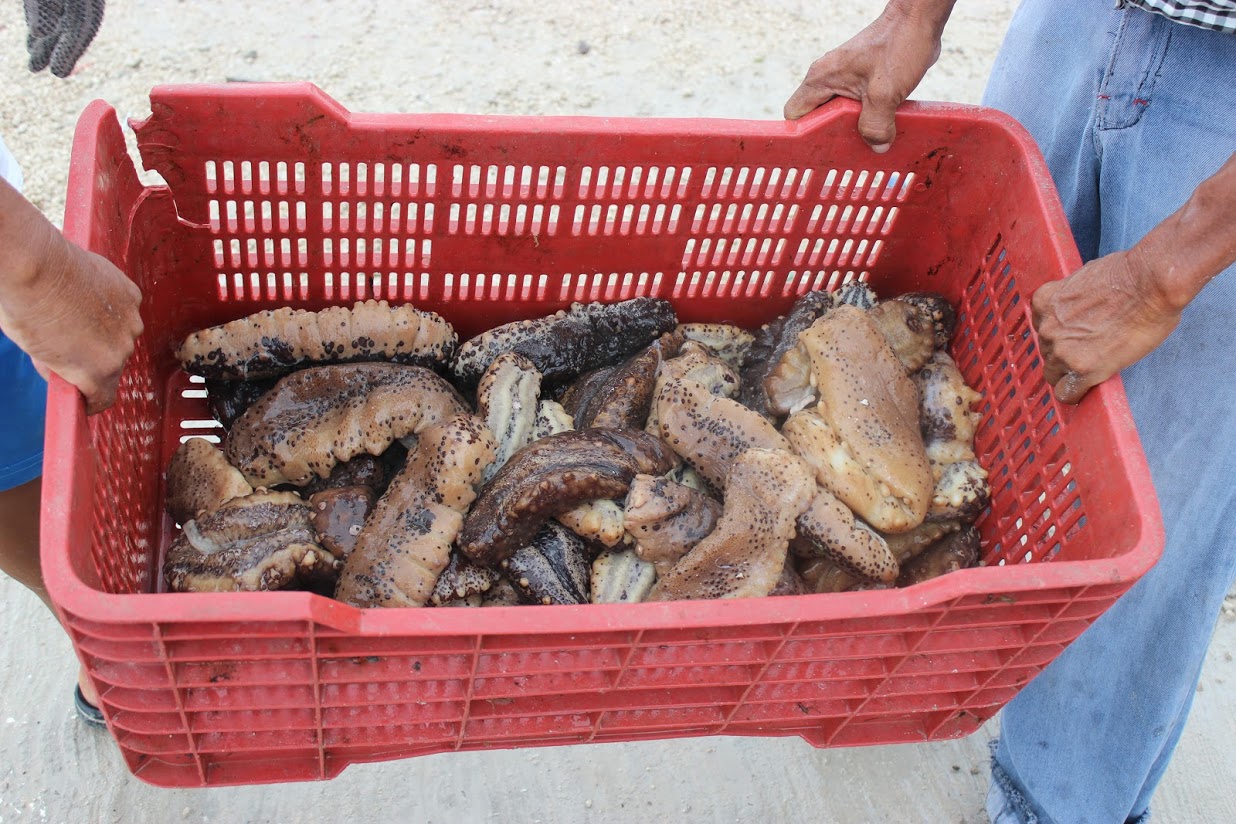
Sea cucumber fishing season 2016 (Dzilam de Bravo, Yucatan, Mexico). Credit: Eva Coronado, National Polytechnic Institute, Mexico.
The researchers based their findings on a case study of Río Lagartos, a fishing community on Mexico’s Yucatán Peninsula. For the past 50 years, small-scale commercial fishing has been the dominant livelihood of the community.
The town’s first commercial sea cucumber permits were issued in 2013, a significant economic opportunity for fishers in the region. The leathery marine animals are a delicacy in many parts of Asia, and as stocks have depleted there, demand has rapidly depleted fisheries across the globe.
A host of new challenges emerged in Río Lagartos as the sea cucumbers attracted outside fishers, money and patrons, according to the researchers’ interviews with community members.
“Resource management, incomes, fisher health and safety, levels of social conflict and social cohesion in the community are all impacted,” says Kaplan-Hallam. “The potential financial rewards are also causing local fishers to take bigger risks as sea cucumber stocks are depleted and diving must occur further from shore, with dire health consequences.”
Unfortunately, say the authors, this isn’t an isolated situation.
“There are many examples around the world where elite global seafood markets–abalone, sea urchins, sharks–are undermining local sustainability,” says Bennett. “If we want to sustainably manage fisheries with coastal communities, we need a better understanding of how global seafood markets impact communities and how to manage these impacts quickly. Think of it like an epidemic: it requires a rapid response before it gets out of control.”
###
The study “Catching sea cucumber fever in coastal communities” is published in Global Environmental Change
The research was funded by the Social Sciences and Humanities Research Council, MITACS, the Banting Postdoctoral Fellowship program, and the Liber Ero Fellowship program.
Committing to socially responsible seafood
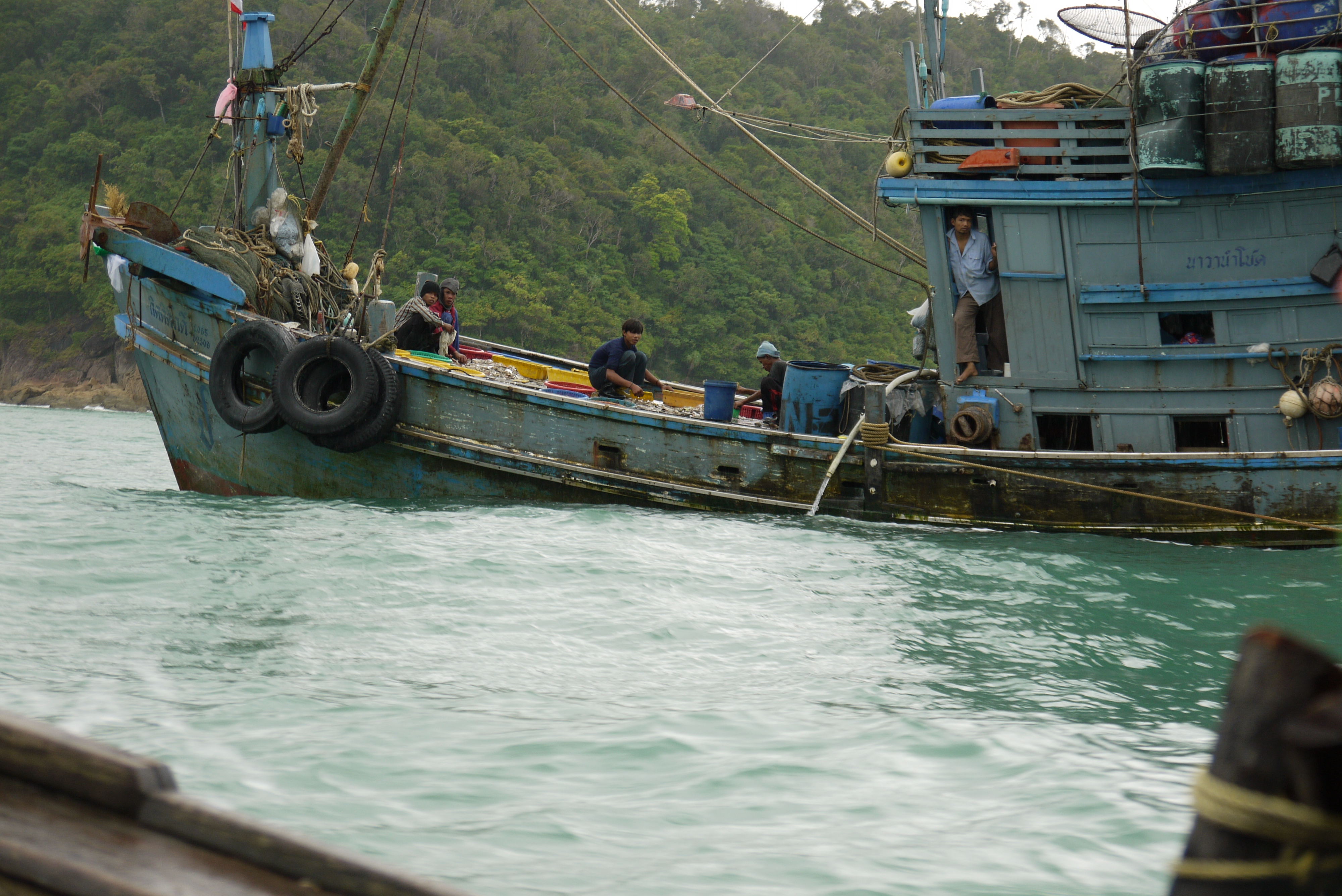
Migrant workers on a fishing boat on the Andaman coast of Thailand (Photo: Nathan Bennett)
Five years ago when working on several projects with the UN FAO’s Bay of Bengal Large Marine Ecosystem Project in Southeast Asia, I became aware of how the global seafood industry was rife with social issues (report). These issues included slavery, welfare and safety issues, child labor, inequitable access to resources for coastal communities, lack of consideration of small-scale fishers in decision-making and ocean grabbing.
Over the past year, I was part of a working group that examined how the global seafood industry might commit to sourcing more socially responsible seafood. This initiative led to a first paper published in Science titled “Committing to socially responsible seafood“. This is just the first step in a much longer initiative.
Summary: Seafood is the world’s most internationally traded food commodity. Approximately three out of every seven people globally rely on seafood as a primary source of animal protein (1). Revelations about slavery and labor rights abuses in fisheries have sparked outrage and shifted the conversation (2, 3), placing social issues at the forefront of a sector that has spent decades working to improve environmental sustainability. In response, businesses are seeking to reduce unethical practices and reputational risks in their supply chains. Governments are formulating policy responses, and nonprofit and philanthropic organizations are deploying resources and expertise to address critical social issues. Yet the scientific community has not kept pace with concerns for social issues in the sector. As the United Nations Ocean Conference convenes in New York (5 to 9 June), we propose a framework for social responsibility and identify key steps the scientific community must take to inform policy and practice for this global challenge. More…
Link to paper: Committing to socially responsible seafood
Eureka Alert News Release: Scientists launch global agenda to curb social, human rights abuses in seafood sector
Ocean Grabbing: Robbing Small Scale Fishers and Coastal Communities of Marine Resources or Spaces
The following open access article on Ocean Grabbing has just been published in Marine Policy: Bennett, N. J., Govan, H., & Satterfield, T. (2015). Ocean grabbing. Marine Policy, 57, 61–68
- Ocean grabbing refers to acts of dispossession or appropriation of marine resources or spaces.
- Ocean grabbing robs fishers and communities of use, control or access to resources, land or the sea.
- This paper presents a framework to evaluate conservation or development initiatives for ocean grabbing.
- Three factors, governance, human security and well-being, determine what constitutes ocean grabbing.
- A systematic program of research into the phenomenon of ocean grabbing is proposed.
Abstract: The term “ocean grabbing” has been used to describe actions, policies or initiatives that deprive small-scale fishers of resources, dispossess vulnerable populations of coastal lands, and/or undermine historical access to areas of the sea. Rights and access to marine resources and spaces are frequently reallocated through government or private sector initiatives to achieve conservation, management or development objectives with a variety of outcomes for different sectors of society. This paper provides a definition and gives examples of reallocations of marine resources or spaces that might constitute “ocean grabbing”. It offers a tentative framework for evaluating whether marine conservation, management or development is ocean grabbing and proposes an agenda for future research. For a reallocation to be considered ocean grabbing, it must: (1) occur by means of inadequate 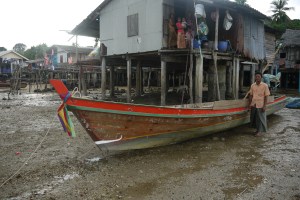 governance, and (2) be implemented using actions that undermine human security and livelihoods, or (3) produce impacts that reduce social–ecological well-being. Future research on ocean grabbing will: document case studies, drivers and consequences; conduct spatial and historical analyses; and investigate solutions. The intent is to stimulate rigorous discussion and promote systematic inquiry into the phenomenon of ocean grabbing.
governance, and (2) be implemented using actions that undermine human security and livelihoods, or (3) produce impacts that reduce social–ecological well-being. Future research on ocean grabbing will: document case studies, drivers and consequences; conduct spatial and historical analyses; and investigate solutions. The intent is to stimulate rigorous discussion and promote systematic inquiry into the phenomenon of ocean grabbing.
Ecologically sustainable but unjust? Negotiating equity and authority in common-pool marine resource management
A paper titled “Ecologically sustainable but unjust? Negotiating equity and authority in common-pool marine resource management” co-authored by Sarah Klain, Rachelle Beveridge and myself was just published in Ecology & Society. The article asks: a) whether natural resource management can be ecologically sustainable but unjust at the same time, and b) if distribution of harvesting rights and socio-economic benefits and inclusion in management is unfair, how might access to resources and governance institutions be re-oriented. We explore these questions through a case study of indigenous peoples’ involvement in commercial sea cucumber and geoduck fisheries on the central coast of British Columbia, Canada using Elinor Ostrom’s social-ecological systems framework and common pool resource design principles.
Klain, S., Beveridge, R, Bennett, N.J. (2014). Ecologically sustainable but unjust? Negotiating equity and authority in common-pool marine resource management. Ecology & Society 19(4), 52.
ABSTRACT: Under appropriate conditions, community-based fisheries management can support sound resource stewardship, with positive social and environmental outcomes. Evaluating indigenous peoples’ involvement in commercial sea cucumber and geoduck fisheries on the central coast of British Columbia, Canada, we found that the current social-ecological system configuration is relatively ecologically sustainable according to stock assessments. However, the current system also results in perceived inequities in decision-making processes, harvesting allocations, and socioeconomic benefits. As a result, local coastal resource managers envision a transformation of sea cucumber and geoduck fisheries governance and management institutions. We assessed the potential robustness of the proposed institutions using Elinor Ostrom’s common-pool resource design principles. Grounded in the region’s legal, political, and historical context, our analysis suggests that greater local involvement in these invertebrate fisheries and their management could provide more benefits to local communities than the status quo while maintaining an ecologically sustainable resource. Our research highlights the importance of explicitly addressing historical context and equity considerations in social-ecological system analyses and when renegotiating the institutions governing common-pool resources.
The article can also be downloaded from this page.

